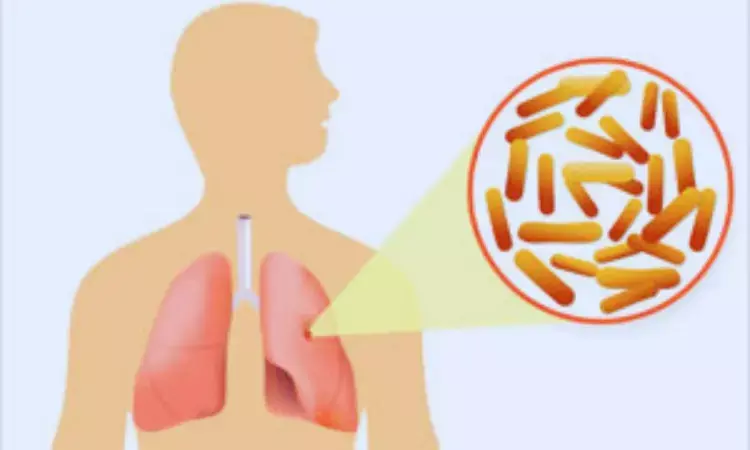- Home
- Medical news & Guidelines
- Anesthesiology
- Cardiology and CTVS
- Critical Care
- Dentistry
- Dermatology
- Diabetes and Endocrinology
- ENT
- Gastroenterology
- Medicine
- Nephrology
- Neurology
- Obstretics-Gynaecology
- Oncology
- Ophthalmology
- Orthopaedics
- Pediatrics-Neonatology
- Psychiatry
- Pulmonology
- Radiology
- Surgery
- Urology
- Laboratory Medicine
- Diet
- Nursing
- Paramedical
- Physiotherapy
- Health news
- Fact Check
- Bone Health Fact Check
- Brain Health Fact Check
- Cancer Related Fact Check
- Child Care Fact Check
- Dental and oral health fact check
- Diabetes and metabolic health fact check
- Diet and Nutrition Fact Check
- Eye and ENT Care Fact Check
- Fitness fact check
- Gut health fact check
- Heart health fact check
- Kidney health fact check
- Medical education fact check
- Men's health fact check
- Respiratory fact check
- Skin and hair care fact check
- Vaccine and Immunization fact check
- Women's health fact check
- AYUSH
- State News
- Andaman and Nicobar Islands
- Andhra Pradesh
- Arunachal Pradesh
- Assam
- Bihar
- Chandigarh
- Chattisgarh
- Dadra and Nagar Haveli
- Daman and Diu
- Delhi
- Goa
- Gujarat
- Haryana
- Himachal Pradesh
- Jammu & Kashmir
- Jharkhand
- Karnataka
- Kerala
- Ladakh
- Lakshadweep
- Madhya Pradesh
- Maharashtra
- Manipur
- Meghalaya
- Mizoram
- Nagaland
- Odisha
- Puducherry
- Punjab
- Rajasthan
- Sikkim
- Tamil Nadu
- Telangana
- Tripura
- Uttar Pradesh
- Uttrakhand
- West Bengal
- Medical Education
- Industry
Urine bicarbonate test offers new, safe quantification of CFTR function in cystic fibrosis patients

A study of 50 adult patients with cystic fibrosis (CF) has found that challenged urine bicarbonate excretion may offer a new, simple, and safe quantification of cystic fibrosis transmembrane conductance regulator (CFTR) function and the extent of its pharmacologic improvement. The study is published in Annals of Internal Medicine.
The management of cystic fibrosis has changed with the recent introduction of therapies that target the disease-causing mechanism. Cystic fibrosis transmembrane conductance regulator (CFTR) modulators, including elexacaftor, tezacaftor, and ivacaftor, are novel drugs that either potentiate or correct CFTR channel dysfunction.
They can partially restore CFTR function. Measurement of sweat chloride concentration is the most used method to assess CFTR function in vivo. However, sweat chloride only associates marginally with clinical disease features, is time consuming, requires experienced staff, and has large intraindividual variation. Many other biomarkers for CFTR exist but have complicated approaches that limit their clinical use.
Renal dysfunction may be related to CF and may be measured through tests quantifying bicarbonate secretion in the kidney that occurs via pendrin. CFTR is fully necessary for the function and regulation of pendrin, which in CF leads to an impaired ability to excrete excess bicarbonate. These patients have a reduced ability to increase renal base excretion after oral
sodium bicarbonate loading, making a challenge test a potential option for drug treatment monitoring.
Researchers from Aarhus University, Aarhus, Denmark studied 50 adult patients with CF starting CFTR modulator therapy with elexacaftor/tezacaftor/ivacaftor to evaluate the association between challenged bicarbonate excretion and clinical characteristics at baseline, quantify the CFTR modulator drug–induced changes of challenged bicarbonate excretion after 6 months of treatment, and characterize the intraindividual variation in healthy adults.
The authors evaluated and quantified urine bicarbonate excretion after an acute oral sodium bicarbonate challenge before and 6 months after elexacaftor/tezacaftor/ivacaftor treatment. They found that challenged urine bicarbonate excretion was associated with CF disease characteristics. The use of elexacaftor/tezacaftor/ivacaftor increased bicarbonate excretion to about 70 percent of that seen in control participants.
According to the authors, their early-stage evaluation shows that that challenged urine bicarbonate excretion offers a new, simple, and safe functional assessment quantifying the biological consequences of reduced CFTR function and the extent of functional recovery after pharmacologic treatment.
Reference:
Peder Berg, Mads V. Sorensen, Amalie Quist Rousing, Hanne Vebert Olesen, Søren Jensen-Fangel, Majbritt Jeppesen, and Jens Leipziger, https://doi.org/10.7326/M22-1741
Dr Kamal Kant Kohli-MBBS, DTCD- a chest specialist with more than 30 years of practice and a flair for writing clinical articles, Dr Kamal Kant Kohli joined Medical Dialogues as a Chief Editor of Medical News. Besides writing articles, as an editor, he proofreads and verifies all the medical content published on Medical Dialogues including those coming from journals, studies,medical conferences,guidelines etc. Email: drkohli@medicaldialogues.in. Contact no. 011-43720751


